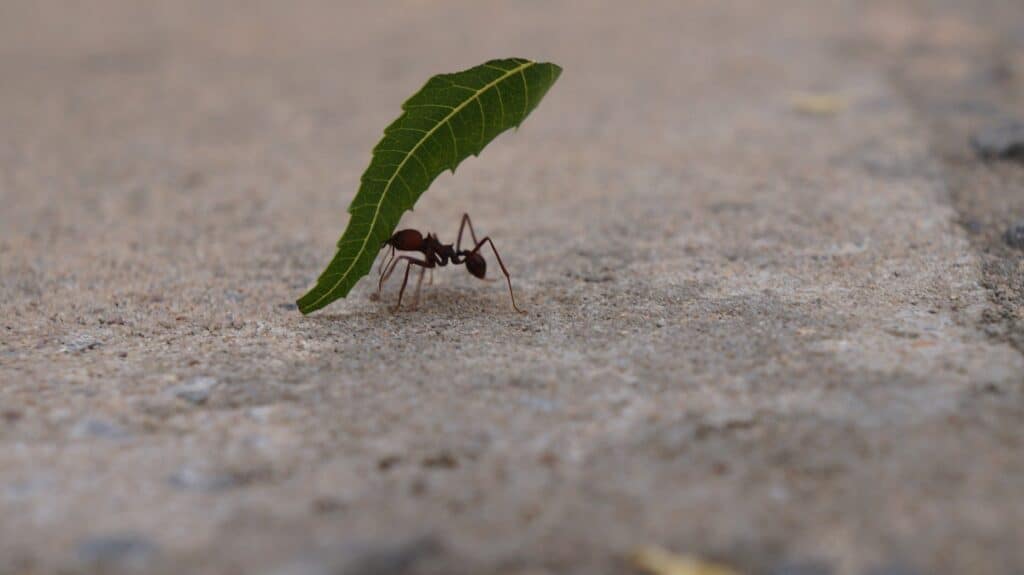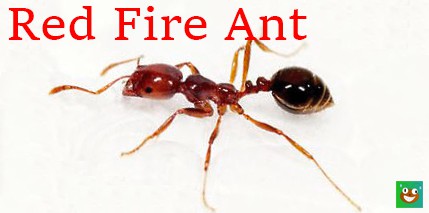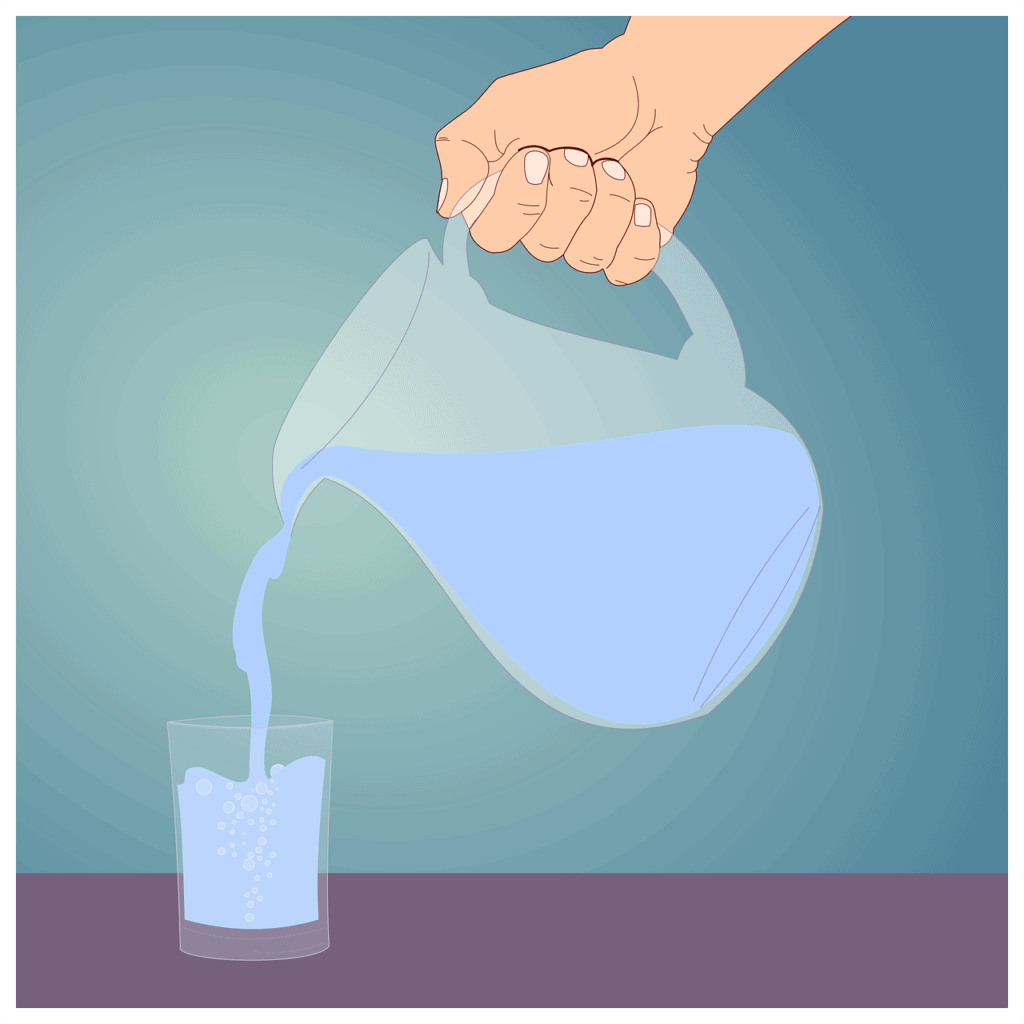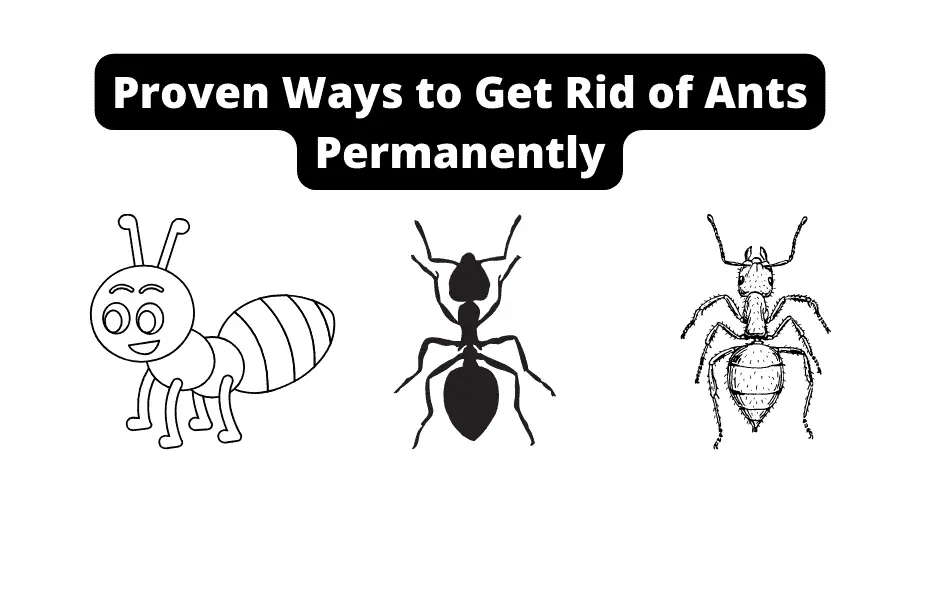Ants are attracted to food and moisture. They can enter homes through small cracks and crevices and quickly establish a nest.
Once a nest is established, ants send out scouts to find food. They will then leave a trail of pheromones for other ants to follow.
This behavior is irrelevant to the species of ant (since all species have worker ants), which is why it’s so important to find what attracts ants at the source. Understanding the behavior of ants can help in getting rid of them permanently.
For instance, removing food and moisture sources can discourage ants from establishing a nest in the first place. Sealing cracks and crevices can also prevent ants from entering the home.
This article is loaded with many tips and tricks so you can FINALLY get rid of those pesky ants, permanetly.
Related Posts:
Tips For Identifying Ant Infestations
Ants are a common problem for many homeowners, and identifying an ant infestation is the first step in getting rid of them permanently.
Ants can enter your home through even the tiniest cracks and crevices, and once they find a food source, they will continue to return. If the infestation is something like carpenter ants or pharaoh ants, they’ll set up shop (nest) right in your home.
Seeing ants in your home is one of the most apparent signs of an ant infestation.

However, it’s important to note that just because you see a few ants doesn’t necessarily mean you have an infestation. Ants may enter your home in search of food or water; if you clean up the area and remove the food source, they may leave on their own.
Another sign of an ant infestation is finding ant trails.
Ants often create a trail to and from their food source, which can help you identify where they enter your home.
You may also notice small piles of dirt or debris near cracks or crevices, indicating ant activity.
If you suspect you have an ant infestation, it’s crucial to identify the type of ant you are dealing with.
Different ants require different treatment methods, so correctly identifying the ant species is crucial. You can use online resources (like our website) or consult a pest control professional to help you identify the type of ant in your home.
You can use this to locate ants!
Methods to Get Rid of Ants
Ants may be tiny, but they can be a big problem when they invade your home.
Fortunately, there are several methods to get rid of ants permanently.
Here are some practical ways to kill ants:
- Bait Stations: Bait stations are a popular and effective way to eliminate ants. The bait contains a slow-acting poison that the ants carry back to the colony, killing the entire colony. Place the bait stations along ant trails and near their entry points. It may take a few days for the bait to take effect, but be patient, as it is effective in the long run.
- Diatomaceous Earth: Diatomaceous earth is a natural, non-toxic powder that can kill ants. The powder is made from fossilized diatoms and works by dehydrating the ants. Sprinkle the powder along ant trails and near their entry points. Be sure to use food-grade diatomaceous earth, as the pool-grade version can harm humans and pets.
- Vinegar: Vinegar is a natural ant repellent. Mix a 2-to-1 vinegar and water solution in a spray bottle. Then, locate the ants and spray the solution along their ant trails near their entry points. The pungent smell of vinegar will deter the ants from entering your home.
- Boiling Water: Boiling water is an effective way to kill ants and destroy their nests. Boil a pot of water and pour it into the ant nest. This method is best used outdoors and should be done carefully to avoid burns.
- Peppermint Oil: Peppermint oil is a natural ant repellent. Mix a few drops of peppermint oil with water in a spray bottle and spray the solution along ant trails near their entry points. The strong smell of peppermint will deter the ants from entering your home.
Using any of these methods can help you get rid of ants permanently.
It is essential to remember that prevention is vital to keeping ants out of your home.
Keep your home clean and free of food debris, seal any cracks or gaps in your walls and foundation, and trim any trees or bushes touching your home.

Related Posts:
Dealing with Fire Ants
Fire ants are a common problem in many parts of the world.
These ants can be aggressive, and their bites can be painful and potentially dangerous, especially for those who are allergic.
Getting rid of fire ants permanently can be a difficult task, but several methods can be effective.
One of the most common methods of getting rid of fire ants is to use bait.
Bait can be purchased at most garden centers and hardware stores (we also have many guides on the website).
The bait is typically made up of a toxic substance attractive to the ants. The ants will carry the bait back to their colony and feed it to the other ants, eventually killing the entire colony.
Following the instructions carefully when using bait is essential, as it can harm other animals and insects.
Another method of getting rid of fire ants is to use insecticides. Insecticides can be sprayed directly on the ants or their nests.
Make sure to use insecticides labeled for fire ants and to follow the instructions carefully. Insecticides can harm other animals and insects, so you’ll need to use them cautiously.

There are also natural methods of getting rid of fire ants. One method is to pour boiling water over the ant mound.
This can be an effective way to kill the ants and destroy their nest. Another method is to use diatomaceous earth, which is a natural substance that can be sprinkled around the ant mound.
The diatomaceous earth will cut the exoskeleton of the ants and cause them to dehydrate and die.
Related Posts:
Ant-Keeper How-To-Guide For Preventing All Future Ant Infestations
Once the ant infestation has been dealt with, you must prevent future infestations.
Here are some ways to do that:
- Keep the area clean: Ants are attracted to food and water sources, so keeping the area clean and free of crumbs, spills, and standing water can help prevent future infestations.
- Seal entry points: Remember, ants are small. Ants can enter through even the tiniest cracks and crevices in and around your home. Sealing these entry points with caulk, caulk, weatherstripping or cotton balls can help keep ants out.
- Store food properly: Ants can easily get into open food containers, so you’ll need to store food in airtight containers or in the refrigerator.
- Trim trees and bushes: Ants can use trees and bushes as a bridge to get into your home. Keeping them trimmed back can help prevent this. It also looks nice.
- Use ant repellents: There are a variety of ant repellents on the market, such as sprays, powders, and baits. These can be effective in keeping ants away permanently.
- Keep ants away from the home: Ants can be attracted to the home for various reasons, such as moisture or warmth. Taking steps to keep ants away from the home, such as fixing leaky pipes and sealing cracks in the foundation, can help prevent infestations.
By taking these steps, it’s possible to prevent future ant infestations and keep the inside of your home ant-free.

Permanent Ant Control Solutions
While many temporary solutions are available, such as sprays and traps, these methods only provide short-term relief.
It is crucial to take a more comprehensive approach to permanently eliminate ants.
One of the most effective ways to control ants is to eliminate their food sources. Ants are attracted to sugary and greasy foods, so keeping a clean kitchen and storing food in airtight containers can help prevent infestations.
Removing standing water or moisture sources will also help deter ants from entering the home, which is something many do not think about.

Think about it: ants are natural hunters and will not enter your home for no reason. If the inside of your home is clean, this will help to keep the ants at bay.
Another method for permanent ant control is to block off their entry points. Ants can enter through even the tiniest cracks and gaps, so sealing these entry points with caulk or weatherstripping can help prevent their entry.
Frequently Asked Questions
Some of the top questions asked by your peers.
What is the most effective ant killer?
The most effective ant killer is a bait that contains slow-acting poison. Ants will carry the poison back to their colony, killing the entire colony. Look for baits that contain boric acid or fipronil. These can be found at most hardware stores or online. (Source)
How do you use diatomaceous earth to get rid of ants?
Diatomaceous earth is a natural and safe way to get rid of ants. Sprinkle the powder around areas where ants enter your home or where you have seen them. The powder will stick and dehydrate their bodies, eventually killing them. Be sure to use food-grade diatomaceous earth, as it’s safest for in-the-house use.
What are some natural ways to get rid of ants permanently?
There are several natural ways to get rid of ants permanently. Some of the most effective methods include using vinegar, lemon juice, cinnamon, or peppermint oil. These can be used as a spray or applied directly to areas where ants are entering your home.
What is the fastest way to get rid of ants in the house?
The fastest way to get rid of ants in the house is to use a bait that contains a fast-acting poison. Look for baits that contain fipronil or imidacloprid. These can be found at most hardware stores or online. Alternatively, you can use a spray containing contact poison, such as pyrethrin.
How do you keep ants away permanently?
You must eliminate their food sources and seal off their entry points to keep ants away permanently. Keep your home clean and free of food crumbs, and store food in airtight containers. Seal any cracks or gaps in your walls or foundation where ants may enter your home.
How long does vinegar keep ants away?
Vinegar can keep ants away for several days to a week, depending on how robust the solution is and how frequently it is applied. To make a vinegar solution, mix equal parts of vinegar and water and spray it directly on ants or areas where they are entering your home. Repeat as necessary.

